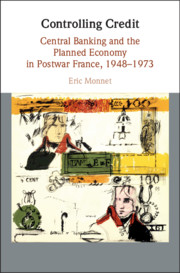Crossref Citations
This Book has been
cited by the following publications. This list is generated based on data provided by Crossref.
Bordo, Michael D.
2018.
An Historical Perspective on the Quest for Financial Stability and the Monetary Policy Regime.
The Journal of Economic History,
Vol. 78,
Issue. 2,
p.
319.
Fontan, Clément
Dietsch, Peter
and
Claveau, François
2019.
Les banques centrales et la justice sociale.
Éthique publique,
Bordo, Michael
Monnet, Eric
and
Naef, Alain
2019.
The Gold Pool (1961–1968) and the Fall of the Bretton Woods System: Lessons for Central Bank Cooperation.
The Journal of Economic History,
Vol. 79,
Issue. 4,
p.
1027.
Chrystal, Alec
and
Capie, Forrest
2020.
The Money Study Group (MSG) at fifty: Twenty years of the MSG and another thirty of the Money, Macro, Finance Research Group (MMF).
The Manchester School,
Vol. 88,
Issue. S1,
p.
1.
PEETERS, RUBEN
2020.
Getting a Foot in the Door: Small-Firm Credit and Interest Group Politics in the Netherlands, 1900–1927.
Enterprise & Society,
p.
1.
Drach, Alexis
2020.
Supervisors against regulation? The Basel Committee and country risk before the International Debt Crisis (1976–1982).
Financial History Review,
Vol. 27,
Issue. 2,
p.
210.
Battilossi, Stefano
and
Yago, Kazuhiko
2020.
Handbook of the History of Money and Currency.
p.
1.
2020.
BIBLIOGRAPHY.
International Review of Social History,
Vol. 65,
Issue. 2,
p.
369.
Battilossi, Stefano
and
Yago, Kazuhiko
2020.
Handbook of the History of Money and Currency.
p.
1.
Lepers, Étienne
2020.
La libéralisation des mouvements de capitaux : entre transformations structurelles, débats circulaires et cadres multilatéraux.
Revue d'économie financière,
Vol. N° 137,
Issue. 1,
p.
247.
Larue, Louis
Fontan, Clément
and
Sandberg, Joakim
2020.
The promises and perils of central bank digital currencies.
Revue de la régulation,
Vol. 28,
Issue. ,
James, Harold
2020.
Making a Modern Central Bank.
Chiapello, Ève
2020.
Faire l'économie de l'environnement.
p.
39.
DRACH, ALEXIS
2020.
Reluctant Europeans? British and French Commercial Banks and the Common Market in Banking (1977–1992).
Enterprise & Society,
Vol. 21,
Issue. 3,
p.
768.
2021.
Monetary War and Peace.
p.
281.
2021.
La rupture ? La Grande Guerre, l’Europe et le XXe siècle.
p.
179.
Wigmore, Barrie A.
2021.
The Financial Crisis of 2008.
2021.
The Financial Crisis of 2008.
p.
408.
Plihon, Dominique
2021.
L’intermédiation bancaire : la grande transformation.
Revue d'économie financière,
Vol. N° 142,
Issue. 2,
p.
99.
Renault, Matthieu
2021.
Le tournant libéral en France ou la liquidation du modèle planiste-keynésien (The Liberal Turn in France or the Dismantling of the Post-WWII Planist-Keynesian Model).
SSRN Electronic Journal ,



